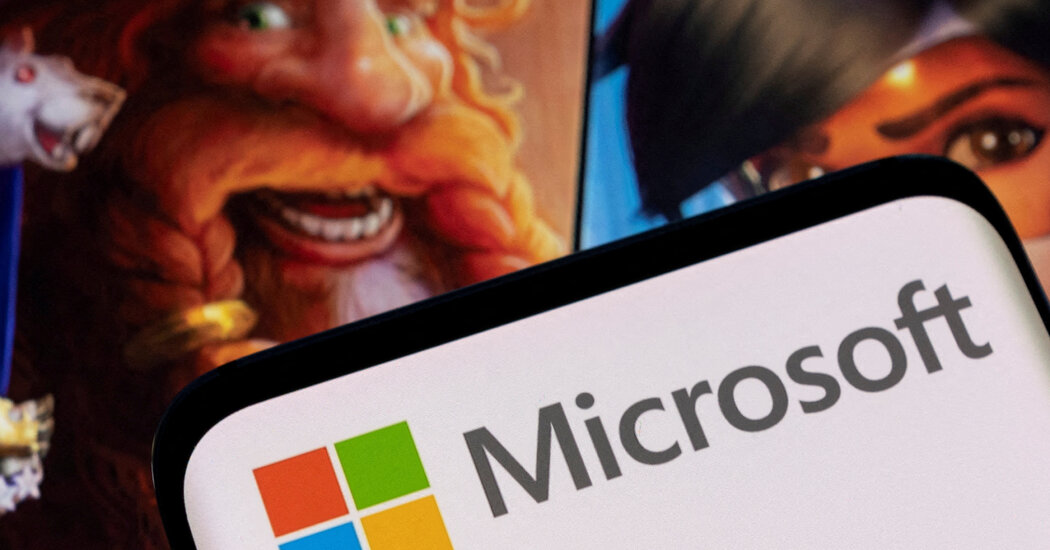
Microsoft came one step closer on Friday to completing its $69 billion purchase of the video game maker Activision Blizzard, in a deal that has become an example of how a company can successfully ride out stricter regulatory scrutiny of the power of tech giants.
Britain’s Competition and Markets Authority, the last remaining agency that must sign off before Microsoft can complete the acquisition, said the companies had taken action that “substantially addresses” remaining antitrust concerns. The regulator initially tried to block the deal, saying it would undercut competition, but reversed course after Microsoft agreed not to buy a part of Activision’s business associated with so-called cloud gaming, a small but promising new area for the industry.
First announced in January 2022, the acquisition has been heavily scrutinized by antitrust officials around the world and held up as a test of whether regulators would approve a tech megamerger amid concerns about the industry’s power. The deal would upend the video game market, combining Microsoft’s Xbox business with Activision, a publisher of such hit video games as Call of Duty and World of Warcraft.
But Microsoft, with experience in thorny antitrust disputes going back to the 1990s, was able to navigate its way through stiff regulatory resistance on both sides of the Atlantic. In July, the company won a court battle against the Federal Trade Commission, which had tried to block the deal. The European Union, typically an aggressive regulator of American tech firms, cleared the deal in May.
“Microsoft was very strategic in its approach in how it played the whole process from beginning to end,” said Ioannis Kokkoris, professor of competition law and economics at Queen Mary, University of London.
He said that it was incredibly rare for Britain’s C.M.A. to reverse course and that the agency had faced a lot of pressure to approve the deal after it cleared hurdles in other jurisdictions.
“When you are the last man standing, you cannot realistically block a deal when the U.K. represents less that 5 percent of the global revenues,” said Tommaso Valletti, a professor of economics at Imperial College Business School who used to work on antitrust cases for the European Commission.
On Friday, British regulators said Microsoft had satisfied their concerns. The C.M.A. initially blocked the deal because, it said, a merger between the maker of a top-selling console with the publisher of hit games threatened to stunt the development of the emerging area of cloud gaming technology. Although still a very small market, the technology allows people to stream games on phones, tablets and other devices, diminishing the need for traditional consoles.
Microsoft agreed to transfer the cloud streaming licensing rights for all current and new Activision Blizzard games to Ubisoft Entertainment, a rival game publisher. The arrangement lasts for 15 years, a move seen as preventing Microsoft from releasing Activision games exclusively on its own streaming service.
“The C.M.A. considers that the restructured deal makes important changes that substantially address the concerns it set out in relation to the original transaction earlier this year,” the agency said in a statement on Friday.
The regulator said it was now holding a “consultation” through Oct. 6 about the remedies Microsoft had proposed before making a final decision on whether to approve the deal.
“We are encouraged by this positive development in the C.M.A.’s review process,” Brad Smith, the president of Microsoft, said in a statement. “We look forward to working with Microsoft toward completing the regulatory review process,” Activision Blizzard said in a statement.
The companies have said they intend to close the deal by Oct. 18.
Government scrutiny of the tech industry’s growing power shows no signs of slowing down. This month, a trial began over claims by the U.S. Justice Department and a group of states that Google abused its power in the online search market. On Friday, E.U. regulators said they would reimpose a $400 million fine against Intel for abusing its power in the market for semiconductors. E.U. authorities are also investigating Apple, Google, Meta and Microsoft for other anticompetitive business practices.
Mr. Kokkoris said Microsoft’s mix of fighting in court and offering business concessions provided a playbook for other tech companies to follow when making large acquisitions.
“This is definitely going to make Big Tech more willing to continue deal making, but the companies know now that they will have to give up something more than they thought before this case,” he said.
This week, Cisco agreed to buy the cybersecurity company Splunk for $28 billion. Broadcom, the semiconductor giant, is also getting closer to completing an acquisition of the software company VMware for $61 billion.













